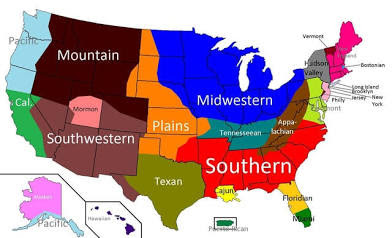Why Do People from the Same Country Share an Accent, Regardless of Race?
Introduction
Have you ever noticed how people from the same country often sound alike, no matter their racial or ethnic background? For example, British people—whether Black, White, South Asian, or mixed-race—often share similar accents when speaking English. Meanwhile, in the U.S., accents vary wildly by region, sometimes making it hard to believe two speakers are from the same country. A White man from North Carolina might sound completely different from a Black man from New York or a Latino from Texas. And don’t even get me started on the thick, almost foreign-sounding drawls of Cajun Country!
So why does this happen? Why do some countries have a dominant accent that transcends race, while others (like the U.S.) have such strong regional variations? The answer lies in history, social dynamics, colonization, and how language evolves.
The British Case: A Unified Accent Despite Diversity
When watching British TV shows—like 'The Cleaner, which my Daughter Hannah enjoys—you might notice that most British people, regardless of race, speak with a similar accent. A Black Londoner, a White Yorkshireman, and a British-Indian from Birmingham might all sound distinctly "British" in their own ways, yet their accents are more tied to their region than their racial background.
Why?
1. The Influence of Received Pronunciation (RP)
- Historically, the British upper class (and later, the BBC) promoted 'Received Pronunciation' (RP), also known as "the Queen’s English." This accent became the standard for education, media, and prestige.
- Even as Britain became more diverse, immigrants and their children often adopted local accents to assimilate. A second-generation Nigerian-British kid in London will likely speak with a London accent, not a Nigerian one.
2. Strong Regional Identity Over Racial Identity
- In the UK, where you’re from (London, Liverpool, Glasgow) often matters more than your racial background in determining your accent.
- Unlike the U.S., where racial segregation historically influenced dialect (e.g., African American Vernacular English), Britain’s smaller size and more centralized media led to more uniform speech patterns.
3. Colonial Legacy
- Many non-White Brits are descendants of immigrants from former colonies (Jamaica, India, Nigeria). Their parents or grandparents may have arrived speaking different languages or dialects, but the next generation grew up immersed in British English.
The American Exception: A Patchwork of Accents
Now, contrast that with the U.S., where accents vary dramatically' by region—sometimes even within the same state. A Black man from Atlanta, a White woman from Boston, and a Latino from Los Angeles will all sound completely different.
Why?
1. The U.S. is Massive and Geographically Diverse
- The U.S. spans thousands of miles, with isolated communities developing their own dialects over centuries.
- Compare a New Yorker’s rapid, clipped speech to a Texan’s slow drawl—these differences come from settlement patterns, immigration waves, and geographic isolation.
2. Historical Segregation Played a Role
- Due to slavery and Jim Crow, Black Americans in the South developed distinct speech patterns (AAVE) that differ from White Southern dialects.
- Meanwhile, Cajun English in Louisiana comes from French-speaking Acadians mixing with English settlers, creating a unique accent.
3. Immigrant Communities Retained Their Influences
- In cities like New York, Italian, Irish, and Jewish immigrants shaped the local accent.
- In Miami, Cuban Spanish heavily influences the English spoken there.
Why Don’t Race and Accent Always Align?
This brings us to the core question: Why do some countries have accents tied to region rather than race, while others don’t?
1. Time and Assimilation
- In Britain, many non-White communities have been present for generations, leading to full linguistic assimilation.
- In the U.S., racial segregation meant that some groups (like Black Americans) developed their own linguistic norms separate from White communities.
2. Media Influence
- Countries with strong national broadcasters (like the BBC) tend to have more standardized accents.
- The U.S. has always had regional media, allowing accents to stay distinct.
3. Colonial vs. Immigrant Societies
- Former colonial powers (Britain, France) often have dominant accents because the colonized populations adopted the colonizer’s language fully.
- Immigrant-heavy nations (U.S., Canada, Australia) have more variation because different groups brought their own linguistic flavors.
The Cajun Example: When an Accent Sounds "Foreign" Even in the Same Country
The original post mentions Cajun Country—and it’s a perfect example of how isolation creates unique accents. Cajun English, spoken in Louisiana, is heavily influenced by French, making it almost unintelligible to outsiders. This happened because:
- The Acadians (French settlers) were isolated in swamps for generations.
- Their language mixed with English but retained French rhythms and words.
Similarly, Appalachian English and Boston’s "Pahk the cah" accent developed due to historical isolation.
Conclusion: Accents Reflect History More Than Biology
At the end of the day, accents aren’t about race—they’re about who you grew up around, what media you consumed, and how your community historically interacted with language.
- In Britain, a shared national identity and media led to accents being more about region than race.
- In the U.S., vast geography, segregation, and immigrant influences created a mosaic of dialects.
- And in places like Cajun Country, isolation birthed an accent so distinct it sounds like another language.
So next time you hear a British person of any race sounding "the same," or a Southern American making you do a double-take, remember: Accents tell the story of a people—where they’ve been, who they’ve lived with, and how history shaped their speech.
Final Thought
Maybe the real question isn’t 'why' Brits sound alike regardless of race, but why Americans sound 'so different' from each other. And the answer? America’s messy, diverse, complicated history—just like its accents.
#Language #accents #speech #natiionality #race



